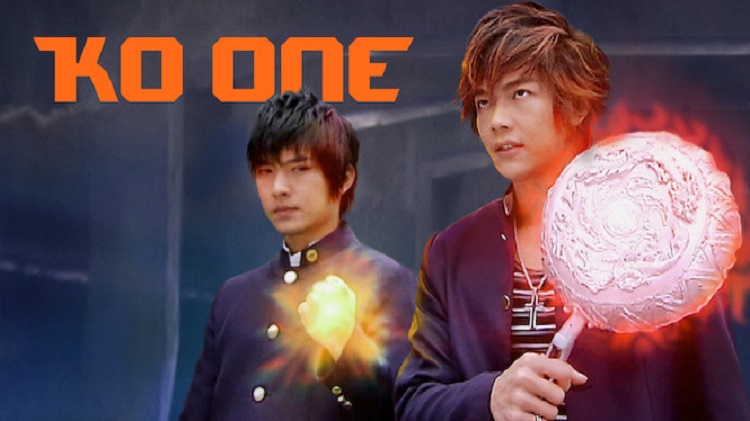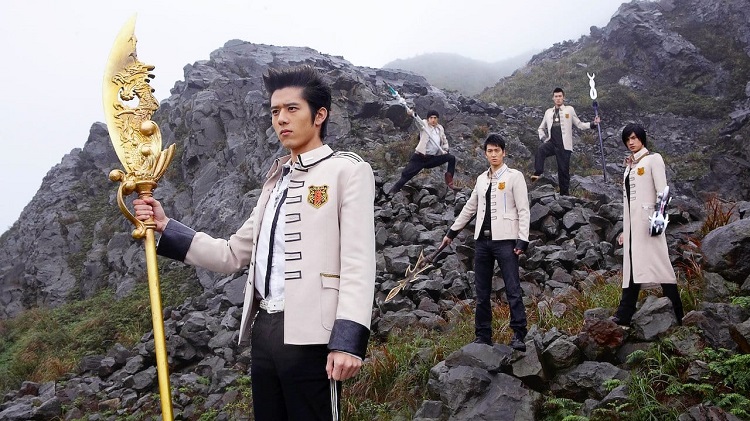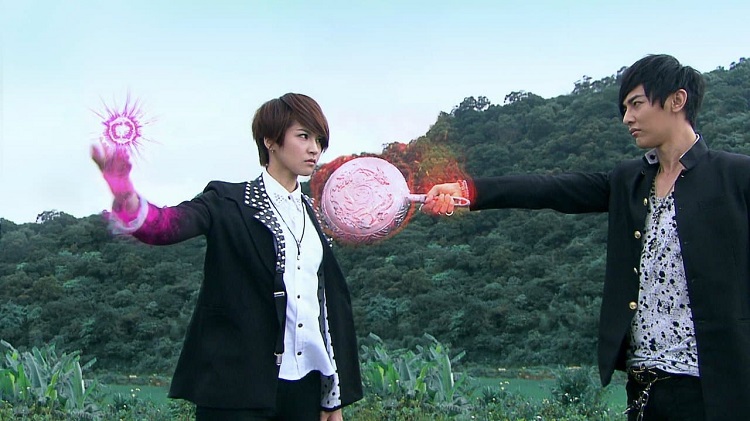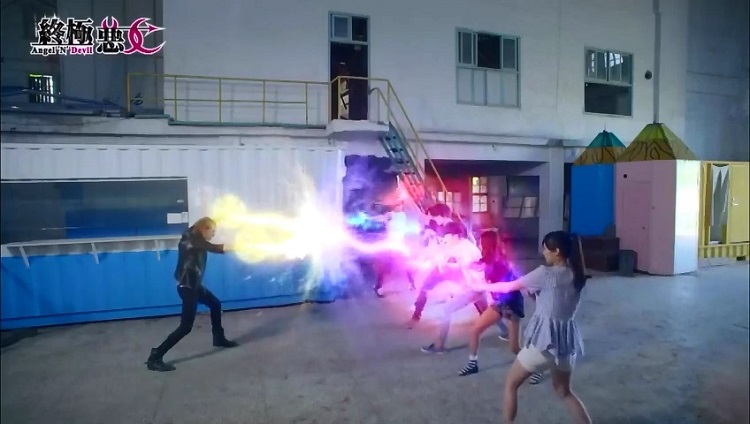Subtext | Back To School With The KO One series
Note: while the shows listed here used to be available on Netflix, they aren’t any more. Still, explaining the stories behind this weird series was one of the reasons I initially started this column. Hopefully the Ultimate Class will return to our screens some day.
This week on Subtext we’re going to look at some Taiwanese shows that between them make up about half the entries in the “Ultimate Series”, usually known in English as the “KO Series”. Starting out as simply a tale of delinquent teens, the shows have expanded into interdimensional conflict, battles against vampires, and even wholescale wars. They’ve mostly existed simply to serve as vehicles for promoting their stars’ musical careers (“idol dramas”, as they’re known), and they’re usually packed with in-jokes, references to musical events, and parodies of current TV shows. But even for the Western audience shorn of that context they’re a fun watch, and well worth checking out if you can.

KO One (“The Ultimate Class”) – 2005
Originally released in 2005 in Taiwan as Zhong Jí Yi Ban (“The Ultimate Class”), this show’s title was changed to “KO One” for its Netflix release. With a rookie director and a writer just starting out, starring a cast of relative newbies, expectations for the show were pretty low. Over the course of its run its ratings never climbed that high, and it remained a cult hit rather than a true breakout. What did break out, though, was its music. The show’s soundtrack was released in 2006 and sold sixty thousand copies, making it the best selling soundtrack in Taiwan that year. The three leads formed a boy band (called “Fahrenheit”), and their debut album was the 11th best selling of 2006. Right from the start, the music was an integral part of the show’s justification.
The plot, as said, starts out relatively simple. In the prestigious Ba Le High School there exists, to the despair of its headmaster, a classroom known as “The Ultimate Class”. Here is where all the delinquents and ne’er-do-wells end up. At the head of the class is Wang Da Dong (played by Jiro Wang), a charismatic bad boy who plays the role of unassuming model student at home for his pastor father and adoring mother. In the “KO Rankings” of most powerful high school students, he is ranked “KO 3”, the third most powerful. Due to having a crush on the teacher, he makes sure the rest of the Ultimate Class stay in line and attend to their studies. One day his position is threatened by the arrival of Wang Ya Se (Calvin Chan), who has an identical power level to his and is also ranked KO 3. Ya Se is the son of a mob boss, wields Excalibur (still stuck in the stone) as a weapon, and loves to quote Shakespeare. At the same time Ding Xiao Yu (Aaron Yan), a piano prodigy ranked KO 4, also joins the class. The three of them butt heads at first (due to the machinations of the evil KO 2) but soon become best friends, bonding at a mysterious outdoor food stall ran by a fighter who lost his mystic powers. Over the course of the series they face many challenges and deal with many mysteries, including the greatest of all: who is KO 1?
The tone of the show is mostly comedic, though it also has elements of mystery and drama throughout. (A large part of the comedy is provided by class clown Jin Bao San, played by Zhang Hao Ming. He provides colour commentary for any fights and is constantly trying to provoke the leads into dueling so he can sell tickets.) It’s not exactly top-notch writing, but the charisma of the leads tends to carry it all off quite well. It’s also fairly low budget, and I’ve described it as “a martial arts show without any actual fighting”, with most of the action taking place off camera. At least half of the show is parody, and at least half of that parody is of references you don’t get, but that’s fine. The show was popular enough to spawn a sequel series, which kept many of the same actors but recast them in new roles by having it take place in “the Iron Dimension”. This was woven into the fiction of “The Ultimate Family” (commonly translated as “The X Family”) by making it about saving them from extradimensional evil. Sadly this series was not released on Netflix, possibly due to a copyright issue with Square Enix. (One character’s outfit is clearly based on cosplay of Cloud Strife from Final Fantasy 7.) The third (and longest) series did make it to Netflix (for a while) though, and it’s a bit of a strange one.

K.O. 3an Guo (“The Ultimate 3 Kingdoms”) – 2008
Romance of the Three Kingdoms (“Sanguó Yanyì”) is a classic of Chinese literature, written in the 14th century about battles for the future of China that took place 1200 years earlier. The story charts the decline and fall of the Han Empire, the rise of the three kingdoms that replaced it, and their struggle for dominance. It’s filled with memorable characters, epic battles and tragic struggles. It’s been the basis of multiple videogames and movies. And it’s what K.O. 3an Guo takes as its basis, moving the action into high school in a metaphor that gets more and more frayed as the show goes on.
The show begins with the heroes of KO One (who have been recruited into the dimensional defence force) being taken on a brief trip into the Silver Dimension by the protagonist of The X-Family, Hu Yan Jue Luo Xiu (played by Shu Chen). At the same time the best friends Guan Yu (George Hu) and Zhang Fei (Bo Yan) are planning to swear a blood oath with Liu Bei (also played by Shu Chen) in order to attend the prestigious Dong Han Shu Yuan school as his retainers. Shenanigans ensue, resulting in the good-hearted Xiu being forced to replace the duplicitous Liu Bei (who is sent into a coma by a rock fall) so as not to disturb the natural course of history within the dimension. Xiu is forced to keep his identity a secret from his new sworn brothers even as he begins to recognise characters from Three Kingdoms in the events around him. Guan Yu and Zhang Fei are soon joined by Zhao Yun (played by Benji), Ma Chao (played by Shang Xiang), and Huang Zhong (played by Wes Lo): a group known in Three Kingdoms as “the Five Tiger Generals”. In reference to this the five actors were formed into a boy band called “Wu Hu Jian”: “Tiger Team”.
Initially K.O. 3an Guo is purely a high school drama, admittedly one with supernatural powers and an air of ancient nobility to it. Over time though, the story becomes more epic. The events of Three Kingdoms are about the fate of a great empire, after all. A lot of the pathos of the show comes from Xiu realising that certain events are bound to happen, and being powerless to change them. The three brothers become friends with Cao Cao (Nylon Chen), for example. Xiu realises this is something that happened in Three Kingdoms – but he also knows that they will eventually wind up at war with him. Another source of drama is his romance with Sun Shang Xian (played by Pets Tseng), which he believes has no future because this is not his home dimension. All of this is against the backdrop of schools that start out as a metaphor for different kingdoms and armies, but which soon become less and less of a metaphor. Throw in extradimensional demons, music as a form of magic, and the massive charisma of the entire cast (George Hu in particular), and it’s unsurprising that this was the only “Ultimate universe” show to get more than one season (three, in fact). Or at least, the only one to officially get more than one season.

KO One Return/KO One React (“The Ultimate Class 2/The Ultimate Class 3”) – 2012/2013
I say that because there’s an argument to be made that React and Return make up two different seasons of the same show. Return was the first series to explicitly be a sequel to KO One, with the title of Zhong Jí Yi Ban 2. Wang Da Dong, still played by Jiro Wang (who was 31 at this stage), is caught in a mystical timequake while returning Liu Bei to the Silver Dimension. This throws him ten years into the future of his own Gold Dimensions, where he finds out that all his friends died in a mysterious conflict shortly after he vanished. He also finds that he is unable to use mystic power anymore, and in fact there seem to be no mystic power users at all in the world any more. He soon finds out that the only place he can find answers is back in Ba Le High School, in the Ultimate Class.
Just as in his own time the Ultimate Class is filled with oddballs and delinquents, and just as in his time they’re kept in line by their powerful leader. This time that leader is King, played by Pets Tseng (who played Sun Shang Xiang in K.O.3an Guo). She’s a no-nonsense fighter (with a secret desire to indulge her more feminine side) who keeps an eye out for her classmates. Keeping an eye out for her is Zhong Wan Jun, an aloof young man who has had a crush on her since childhood. He’s played by Sam Lin, one of the founding members of the Taiwanese boy band SpeXial. (Another founding member was his childhood friend Brent Hsu, who plays the vain but elegant classmate Hua Linglong, and another was Wes Lo who had starred in K.O.3an Guo. Once again the intertwining nature of these shows and their stars’ musical careers is clear.) The only familiar face in the class is the clownish Jin Bao San, who it turns out has been repeating his final exam for the last decade. Jiro Wang left the show halfway through the season due to scheduling conflicts, but in a way this was a good thing as it gave the other characters room to grow. The result is one of the most tightly plotted series in the franchise.
It’s hardly a spoiler to say that Return ends with the timeline being reset, as that’s the basic premise of React. Once again it is ten years after KO One, and once again Wang Da Dong must return to Ba Le High School – this time ten years older and an agent of the interdimensional defence force. There are reports of demonic activity at the school, so he must investigate – with Xiu making an occasional cameo as his handler. The Ultimate Class still has mostly the same members as in Return, though this time they are mystic power users rather than normal fighters. This is the real payoff of the season, seeing these characters’ abilities amped up and usually nicely referencing their previous behaviour or tactics. There are also transfer students thrown into the mix, including Luo Hong Zheng and Huang Wei Jin of SpeXial. Sadly the majority of the season is not quite up to Return’s standard, with the plotline meandering slightly in its back half and some character storylines never getting a solid conclusion. It doesn’t help that the season’s romantic pairing is Da Dong with King. Jiro Wang and Pets Tseng are both decent actors but in my mind they lack any real chemistry and this undermines the finale of the storyline.

Angel ‘N’ Devil (“The Ultimate Bad Girls”) – 2014
The final series from the franchise currently on Netflix is Angel ‘N’ Devil, a show that at first seemed like the breath of fresh air the franchise needed. In between it and React was The X-Dormitory, a direct sequel to The X-Family (which is probably why it also isn’t on Netflix). In its first episode Angel ‘N’ Devil looks like an entirely new cast with an entirely new premise – in the Bronze Dimension, five girls have made an agreement with a being of light named Xiong Ya (played by Teddy Lian of SpeXial). In exchange for having their wish granted (such as being cured of a terminal illness, or having their family lifted out of poverty) they have agreed to fight against evil vampires as the “Bad Girls”. When one of them is murdered, her sister Xiao Feng (played by Wen Yufei, sometimes credited as Sylvia Wang, who had been a major secondary cast member in K.O.3an Guo, Return, and React) investigates and soon winds up joining the “Bad Girls”. She’s not the only one determined to solve the murder though – the dead girl’s boyfriend Charlie Wang (Simon Lian, also a member of SpeXial) is determined to track down who killed her as well.
Sadly, Angel ‘N’ Devil’s status as a breath of fresh air didn’t last. The core female cast (with the exception of Wen Yufei) had been formed into a band called A’N’D, but their music was not a hit. This led to them being gradually sidelined and the introduction of more SpeXial members to bolster the cast. Notable additions were Luo Hong Zheng and Huang Wei Jin, who played characters very similar to their KO One React roles. As a result the show feels more and more like a retread of previous stories. Once again it’s a sad reminder that the onscreen story in idol dramas is often secondary to the offscreen success of its stars.
Angel ‘N’ Devil is the last show from the “KO Universe” that appeared on Netflix, but it’s not where the series ended. In 2017 there was a remake of K.O.3an Guo, though in the continuity of the show this was sold as a timequake causing history to repeat itself so it could stay in continuity. There have also been two more direct sequels to the “Ultimate Class” shows, with English titles of KO One Re-member and KO One Re-call. A sixth is currently filming, and will be released in Taiwan around the end of 2022. None of these have had an official English release, and none of the shows that used to be on Netflix are there any more, but we remain hopeful that the over-the-top adventures of the KO rankings will one day return to our screens.
Images via Netflix.

